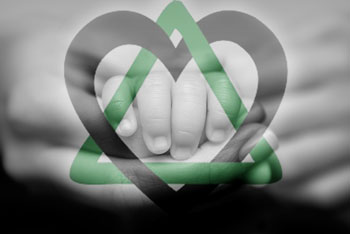Page 1 Page 2

Three months after Abigail had reunified with her birth father, Mark and I received another call about a 10-month-old girl who had been in foster care for two months. When she came into our lives, Bella was withdrawn, overweight, and rarely smiled or made a sound. Mark and I got to work loving her and creating a stable and predictable environment where, after three months, Bella started to emerge from her protective shell to reveal her true self: affectionate, gentle, and intelligent; a completely delightful child.
Bella was about 18 months old and had just started to talk when my father stayed overnight in her room. After being read her bedtime stories, Bella usually went straight to sleep in her crib without struggle. But this time, as I attempted to put her down, Bella pointed to my father, indicating that she wanted to sleep next to him instead of by herself. “Would that be okay with you?” I asked, expecting him to refuse. He had been reading the latest New England Journal of Medicine in the bed with one hand under his chin. “Sure,” he said, letting the journal drop to the floor and folding the covers over to welcome her. The two of them spent a peaceful night snuggled next to each other that forged a deep and tender connection.
Bella often asked to talk to my father on the phone.
“Hi, Grampa,” she said.
“How’s my girl?” he asked, his voice buttery love, melting the distance between them.
“I love you.”
My father chuckled, a warm, joyous sound I wished I had heard more of growing up. For a time, my father called every week to talk directly to Bella or to ask me about her.
I thought the two of them could have continued like that for years, except that Bella was approaching her eighteenth month in foster care, the statutory limit for children under 3. She had been with us for sixteen months, and during the entire time, court orders had allowed her birth parents to maintain contact with her. Bella’s mother had been in and out of jail and residential rehab facilities, but she still rode the bus several hours each week to visit with Bella in a monitored setting. Bella’s 55-year-old father had more liberalized visits because he was a “non-offender,” which meant he had no criminal background. He also had a job, an apartment, and was the sole caregiver for Bella’s 6-year-old brother. Since the foster care system favored family reunification, Mark and I knew that nothing less than a miracle would enable Bella to remain with us. But still, I was completely unprepared when the social worker called to tell me she had recommended reunification. I cried. I cursed. I got down on my hands and knees and shook my raging fist at the sky.
Bella had lived with Mark and me for sixteen of the first twenty-six months of her life, which meant we were the only family she had ever known. During that time Los Angeles County Superior Court had ordered Bella and her father to gradually spend more time together, but her transition from Mark and me to her birth father seemed haphazard and rushed. Once the social worker notified us about her recommendation for reunification, we had only ten days to prepare Bella for one of the most traumatic events a child that age could experience.
In the days leading up to Bella’s reunification hearing, my father called frequently to check on her and listen to me vent my frustration and anger about the foster care system and the unprofessional social workers involved in the case. Drowning in rage and sadness, I could barely appreciate the full miracle to which I was a witness: my father seemed to know exactly what I was thinking and feeling.
“Will you continue seeing her?” he asked.
* * *
At Bella’s reunification hearing, Mark and I secured a court order allowing us weekly visitation with her, even though her birth father was granted full custody. We included Bella’s brother and Abigail in those visits and took them to museums, the beach, bike rides, and the zoo. When the order expired after eight weeks, initially Mark and I feared Bella’s father would sever contact with us. Instead, I enrolled the children in swimming class. He still allows us to continue seeing his children, even though sometimes a month will pass without him returning one of our phone calls.
* * *
Bella and Abigail have taught me that the hardest part about having children is letting them go. I suppose their birth fathers have learned a variation of this lesson, as well, while finding space in their lives, if not their hearts, to allow their children to continue seeing Mark and me. Becoming a parent has also enabled me to rediscover my father’s tenderness and loving, a side of him that has always existed, but that I could not see through the haze of our shared past until I let go.
Page 1 Page 2
Pages: 1 2

